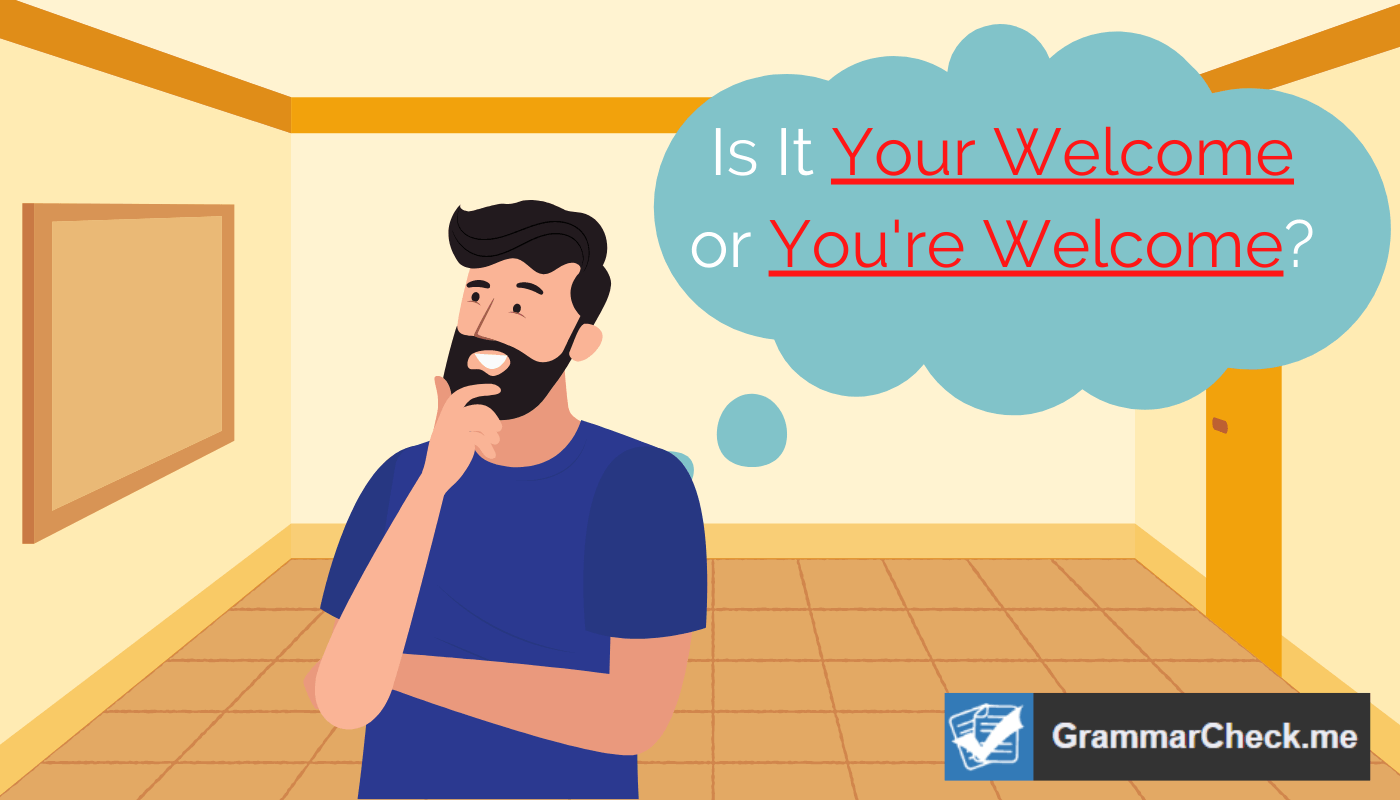This holiday season you gave out more gifts than usual. A present for every niece and nephew. This is about the time when thank you cards start flowing in. However, it can be tricky knowing how to properly respond to someone giving thanks. Is it your welcome or you’re welcome? In this post, we’ll cover exactly how you should respond and give some examples.
Always using the right words? Make sure:
Check Your TextYour or You’re

“You’re welcome” is the correct phrase to use after being thanked. This phrase is a contraction for “you are welcome”. In the English language, it is how you acknowledge being thanked. Your & you’re may sound similar, but these two words have a different meaning [1].
Correct Use: A conversation between David & Thomas.
David: “Thank you for reminding me of my doctor’s appointment.”
Thomas: “You’re welcome. I am happy to help!”
Incorrect Use: A conversation between Mike & Jeff following Mike’s recent wedding.
Mike: “Thank you for the wedding present my wife really loved it!”
Jeff: “Your welcome. I figured you two would love that gift!”
The Meaning Of Your
Your is a possessive pronoun that is used to show ownership of a particular thing. It is one of the most commonly confused words, just like the words play it by ear or year. It can be used to indicate ownership of:
- Objects
- Emotions
- Thoughts
- and More
Download Our eBook To Learn How To Create Amazing Content 1x Faster!
Here are some examples of how to use your correctly in a sentence.
- “I love your sense of humor.”
- “Your dog is too cute!”
- “Your automatic response to every situation is to panic & overreact.”
In these cases, “your” conveys a sense of ownership or possessiveness. But there’s more to it than that. There’s also a sense of pride and admiration. After all, when we say we love something about someone, we are essentially saying that we appreciate and value that quality.
Takeaway: If you are trying to decide between “your” & “you’re”, first determine if you are looking for a word to show possession. If you are, “your” is the correct one.
The Meaning Of You’re
If you teach English, lecturing on the difference between “your” & “you’re” is one of the most important lectures in basic grammar. Just like with the similar words, Blond and Blonde, people just can’t seem to get it right.
- “You’re” is a contraction of the words “you” and “are.”
The most popular example of you’re in a sentence is the phrase “You’re welcome”. Here are some other example use cases:
- “I’m going to assume you’re happy with that.”
- “You’re my favorite person in the world!”
- “You’re going to love this restaurant, it has the best pizza.”
Takeaway: You have the correct answer if you can replace “you’re” with “you are”.
What About You’re Welcomed?
The correct phrase to use is you’re welcome. It is not grammatically correct to respond to thanks with “you’re welcomed”. This is a common spelling rule that most new writers get wrong.
Welcome vs Welcomed Examples:
- You have been welcomed to join the king’s dinner party tomorrow night.
- If you think you are so smart, I welcome you to try to solve the puzzle.
- After abandoning my teammates at practice, I was not welcomed back to the team with open arms.
- You’re welcome! I am happy I could help out!
Welcome is a very common interjection! However, be sure to understand the difference between conjunction and interjection so that you don’t make simple grammar mistakes!
Alternatives to You’re Welcome
In some situations, using the phrase “you’re welcome” is too serious and formal. Here is a list of more casual synonyms to use when talking with family or a close friend. There is no right or wrong phrase…so pick your favorite. Remember, if you pick an alternative phrase it has to have the same meaning! For example, if you confuse drier with dryer, the meaning of the whole sentence changes!
- “My pleasure” – Simple and to the point.
- “Don’t mention it” – A nice way to brush off the thanks and deflect attention away from yourself.
- “Sure thing” – Perfect for casual conversation.
- “Any time” – A friendly way to let them know you’re always happy to help.
- “Glad to be of service” – A bit more formal, but still friendly.
- “No problem” – Informal and casual, perfect for close friends and family.
- “Happy to help” – Another nice way to show that you’re glad you could be of assistance.
When Should You Say “You’re Welcome”?
Here are some examples of when it is appropriate to say “you’re welcome” in day-to-day life. Remember, it can’t hurt to be polite!
- When someone thanks you for a favor.
- When someone expresses gratitude for a gift.
- When someone thanks you for holding the door open for them.
- When someone expresses appreciation for your advice.
- When someone thanks you for your time & effort.
You can use this phrase after someone expresses their thanks & appreciate for your words, time, or actions. Just remember to use the correct spelling of “you’re”!
FAQs – Grammar Rules
“You’re welcome” is the correct phrase. Although it is a common mistake to respond “your welcome”, that is not the correct answer. “Your” is used to show possession.
When used in the correct setting, it is polite & appropriate to say you’re welcome. There are more casual responses such as, “no problem” or “anytime” that can be used when talking to close friends or family.
There are many similar phrases in the English langue that new writers often get wrong like “her and I & she & I“. You’re is a contraction that means “you are”. Your is a possessive pronoun that is used to show ownership or possession. For example, you might say “That is your basketball.”
Yes, saying “you’re welcome” after you are thanked is grammatically correct. There are several other ways to respond to being thanked such as “no problem”, “don’t mention it”, or “my pleasure”.
Although both terms have similar meanings, they are used in different situations. “Welcome” is correct when used as an adjective, present tense verb, or interjection. “Welcomed” is used as a verb to approve of an event or to be happy to entertain something or someone.
You’re welcome is respond after you are thanked by someone. This is a very common response in the English language.
The Bottom Line
Now that our quick grammar lesson is complete, you have the knowledge to choose between “your” & “you’re“. Using these words correctly are one of the most common writing conventions. And if someone thanks you for a gift, respond to them “you’re welcome.” Most people struggle with the difference between these two words, but you now have the skills to use these two words correctly in your everyday writing.

